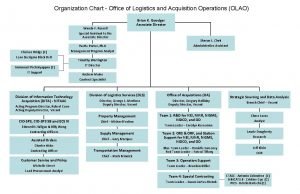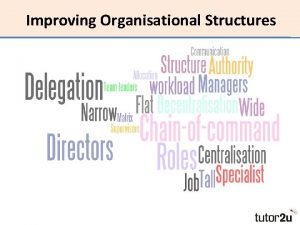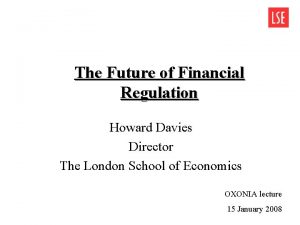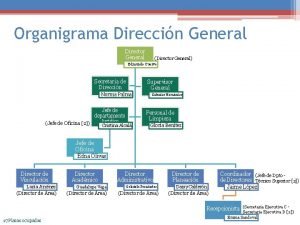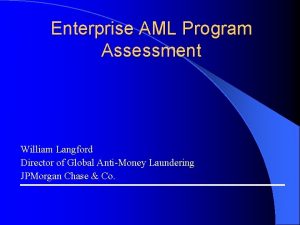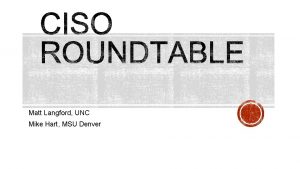Dr Peter Langford Director peter Langfordvoiceproject com www



























- Slides: 27

Dr Peter Langford Director peter. Langford@voiceproject. com www. linkedin. com/in/petelangford 1 values-based leadership

“Senior management behave in a way that is consistent with the values of this organisation” Strongly Disagree Tend to Disagree Neither/ Mixed Feelings Tend to Agree Strongly Agree 1 2 3 4 5 53% Agree 2 values-based leadership

key driver analysis 3 values-based leadership

some definitions Values = beliefs in the importance of specific behaviours and outcomes Core values = long-standing and particularly important values (may be couched in other language such as “guiding principles” or described as part of a “mission statement”) Values-based leadership = a way of leading in which core values play a central and explicit role in everyday decisions, goals and actions 4 values-based leadership “Should I call them ‘core values’? ”

scientific history of values-based leadership stewardship (Block, 1993) transformational leadership (Burns, 1978) authentic leadership (Avolio, Gardner, Walumba, Luthans & May, 2004) servant leadership (Greenleaf, 1977) ethical leadership (Brown, Trevino & Harrison, 2005) 5 values-based leadership (Copeland, 2014)

why is values-based leadership effective? “Why” shapes “what” Uplifting, aspirational & futurefocused Efficiency from clear expectations & aligned behaviour Reduces conflict with stakeholders Reflective & self-correcting 6 values-based leadership

values-based leadership is not. . . The quickest way to short -term gains Naive A cure-all Values-prescriptive Values-neutral “Our core values statement is now official!” 7 values-based leadership Easy

what are your core values? 1 minute to write down your organisation’s core values Who could describe them precisely? How unique are your organisation’s core values? 1 minute to write down your personal core values 8 values-based leadership DR PETE

the “big five” domains of behaviour The most researched and scientifically validated model of human behaviour. . . by far • As of Oct 2018, 5740 peer-reviewed studies in EBSCO academic database • 9 times more than the second most studied model of Myers-Briggs • Arose out of natural language analyses of behaviour descriptions • All domains have different positive consequences, each thought to have different evolutionary benefits 9 values-based leadership

voice leadership 360 Langford, Dougall & Parkes (2017). Measuring leader behaviour: evidence for a “big five” model of leadership. Leadership & Organization Development Journal. Download paper for free from Emerald Publishing (until mid 2019, I think? ), search for above reference stress management vision & inspiration happiness high expectations work-life balance advocacy health & safety verbal influence receiving feedback empathy quality developing others speed recognition problem-solving cooperation time-management performance correction intellectual stimulation risk-taking 10 values-based leadership continuous improvement optimism

“big five” values gratitude beauty pride pleasure resilience peace impact influence wellbeing vision advocacy work-life balance fulfilment high expectations inspiration safety security fitness enjoyment celebration health © courage community trust caring ethics contribution excellence self-discipline inclusion recognition risk management art research continuous improvement precision reason integrity process justice quality empowerment equality efficiency responsibility teamwork sustainability engagement reliability respect honesty wealth action passion service family winning progress achievement challenge positivity power risk taking learning agility creativity curiosity exploration innovation freedom diversity change design growth entrepreneurship truth tradition order accountability transparency

example of core values 12 values-based leadership

example of core values (see Q&A with CEO Stephen Judd in your folder): 13 values-based leadership

example of core values (see Q&A with Marnie Mitchell, Head of People & Culture, in your folder): 14 values-based leadership

2018 Edelman trust barometer trust in institutions to do the right thing media government 31% business 35% 45% credibility of information from. . . journalist govt official 28% 30% 15 values-based leadership ceo 39% ngo’s 48% most broken academic 63% government 56%

7 values failures in leaders short-term Behaviours driven by short-term desires, fears and frustrations without considering overarching values egocentric Focused on empowering oneself, with minimal focus on others; sees life as win-lose narrow-minded No, or few, explicitly prioritised values; behaviour suggests only one or two core values concealed Values are not conscious or not openly referenced in decisions, goals, behaviours or comms; motives may be concealed inconsistent Inconsistency between walk and talk; self-ratings of behaviours are more positive than, and unaligned with, others' perceptions defensive divisive Avoids evaluation by self and others; hostile reaction, lacking compassion towards self and others, when values questioned Believes own values are seen as superior to others’, and others should adopt one's own values; sees others as allies or enemies 16 values-based leadership

ideals of values-based leadership short-term Behaviours directed towards long-term outcomes, consciously reflecting core values, even if incurring short-term pain egocentric Focused on empowering a broad range of people including those outside one's tribes; sees most decisions as win-win narrow-minded concealed Has explicitly prioritised values covering all of the big five domains Values are regularly referenced in decisions, goals, behaviours and communications; motives are transparent long-term empowering broad-minded transparent inconsistent Walks the talk; alignment between self and others' evaluation of one's behaviour authentic defensive Conscious self-review of values most days; formal feedback from others 2+ times a year; values evolve slowly over time reflective A diversity of values is embraced and celebrated; open to new ideas, negotiation and compromise inclusive divisive 17 values-based leadership

maturity in values-based leadership reactive 1 proactive 2 3 © integrated 4 5 short-term Behaviours driven by short-term desires, fears and frustrations without considering overarching values Values and some behaviours reflect long-term ideals, although shortterm impulses often dominate when stressed Behaviours directed towards long-term outcomes, consciously reflecting core values, even if incurring short-term pain long-term egocentric Focused on empowering oneself, with minimal focus on others; sees life as win-lose Focused on empowering one's tribes, only mild consideration for people outside one's tribes Focused on empowering a broad range of people including those outside one's tribes; sees most decisions as win-win empowering narrow-minded No, or few, explicitly prioritised values; behaviour suggests only one or two core values Has explicitly prioritised values that reference three of the big five domains Has explicitly prioritised values covering all of the big five domains broad-minded concealed Values are not conscious or not openly referenced in decisions, goals, behaviours or comms; motives may be concealed Values are referenced occasionally for big decisions, but most behaviours are habitual or driven by goals rather than values Values are regularly referenced in decisions, goals, behaviours and communications; motives are transparent Inconsistency between walk and talk; self-ratings of behaviours are more positive than, and unaligned with, others' perceptions Some overlap, some gaps between walk and talk, and between self and others' perceptions of one's behaviour Walks the talk; alignment between self and others' evaluation of one's behaviour authentic defensive Avoids evaluation by self and others; hostile reaction, lacking compassion towards self and others, when values questioned Self-review of values a few times a year; formal feedback from others once a year; mild defensiveness in response to feedback Conscious self-review of values most days; formal feedback from others 2+ times a year; values evolve slowly over time reflective divisive Believes own values are seen as superior to others’, and others should adopt one's own values; sees others as allies or enemies Differing values of others are tolerated; tend to avoid others with different values; values differences sometimes lead to conflict A diversity of values is embraced and celebrated; open to new ideas, negotiation and compromise inclusive inconsistent

how to build maturity in values-based leadership reflect and agree upon desired core values 19 values-based leadership embed core values in work practices

reflect and agree upon desired core values 20 values-based leadership

reflect and agree upon desired core values 1. Inclusive, divergent brainstorming • What are our espoused values? • What are our enacted values? • What goals, activities and outcomes give us the most energy and fulfilment? • What do we admire in others? • What are the strong and unique features of our character, context and history? • Use the “big five” values tool to prompt possibilities and ensure breadth of values • Involve all staff and the Board 2. Convergence through surveying or voting on shortlisted values 3. Use a representative group to flesh out example behaviours 4. Package the core values in an attractive way for ongoing comms 21 values-based leadership

embed core values in work practices recruitment processes development Frontline staff, managers, executives, Board members Decision frameworks, codes of conduct, risk management, audits, transparency Orientation, competency models, ongoing training, development opportunities feedback recognition correction promotion communication 22 values-based leadership Informal day-to-day, regular formal, 360 s, employee and customer surveys Day-to-day “thanks”, monthly/annual awards, celebrations, bonuses Calling out inappropriate behaviour, grievance-handling, whistleblowing Setting promotion criteria, monitoring who gets promoted Executive updates, newsletters, posters, banners, role-modelling

case study: Cricket Australia 41 recommendations, including: • Establish stakeholder representative council and an ethics commission • Integrate multiple ethical/values frameworks • Awards to consider behaviour in line with values • Umpires to rate teams and warn/ban players based on values and Code of Conduct • Distribute guidance and deliver training on ethical behaviour and moral courage • The Board of CA be subject to Code of Conduct • Increase gender diversity among executives 23 values-based leadership

suggested readings practitioner-oriented books: • • Freeman & Auster (2015), Bridging the values gap: how authentic organizations bring values to life Gamb (2018), Values-based leadership for dummies research-oriented review articles: • • Trevino, Nieuwenboer & Kish-Gephart (2014), (Un)ethical behaviour in organizations, Annual Review of Psychology, 65, 635 -660 Copeland (2014), The emerging significance of values-based leadership: a literature review, International Journal of Leadership Studies, 8(2), 105 -135 24 values-based leadership

30 tips for values-based leadership in 60 seconds 1. You won't be perfect, so practice 2. Lock time away self-compassion in your calendar for self-reflection 3. Start a values journal 5. Use the "big five" to consider broadening your values 4. Write down your values 6. Guess what others would say your values are, then ask them 25 values-based leadership 7. Consider what values lie behind your goals 9. Do a 360 survey 12. Identify where you don't walk your talk 8. For 30 days, score yourself on how well you lived your values 10. Relax & listen, don't defend, when others provide feedback 11. Talk about values more often - at work, at home 13. Study the values you struggle with the most 14. Read autobiographies of leaders with values you admire 15. Post your values in places you'll see regularly

30 tips for values-based leadership in 60 seconds 16. Have a guess at what others value 18. Go a little lighter on enforcing your values on others 17. Open yourself to others' values, dip your toes in their world 19. Reflect on what you'd like others to say about your values when you die 20. Fess up, to yourself and others, when you don't live your values 26 values-based leadership 21. Say sorry more often 22. Say thanks more often 26. At least once a year, reflect on how your values should evolve 28. Get good at picking yourself up and putting yourself back on track 23. Every day, recognise at least one thing you're grateful for 25. Give yourself hearty praise when you live your values 27. Accept that you'll often fail to live your values 24. Understand what derails you from living your values 29. Don't take yourself too seriously, laugh at yourself a bit more 30. Values-based leadership is a life-long journey

questions Contact us if you’re interested in us running this presentation in-house Voice Project p: 1800 8 VOICE (1800 886 423) e: enquiries@voiceproject. com w: www. voiceproject. com 27 values-based leadership
 Dr peter langford
Dr peter langford Cơm
Cơm Bài thơ mẹ đi làm từ sáng sớm
Bài thơ mẹ đi làm từ sáng sớm Susan langford
Susan langford Ken langford
Ken langford Iwf.org.uk
Iwf.org.uk Colin langford
Colin langford Clinical labs langford
Clinical labs langford Cisco threat intelligence director
Cisco threat intelligence director English comic actor and film director
English comic actor and film director Nec consultants
Nec consultants Logistics organizational chart
Logistics organizational chart Kill the director ukulele
Kill the director ukulele Vestimenta de la tragedia griega
Vestimenta de la tragedia griega Macromedia director mx
Macromedia director mx Director or manager
Director or manager Reflective style of communication
Reflective style of communication Howard davies (director)
Howard davies (director) Director general organigrama
Director general organigrama Intelligence analysis summer internship program nsa
Intelligence analysis summer internship program nsa Analyst hierarchy
Analyst hierarchy Managing director message for company profile
Managing director message for company profile Responsabilidades de un director de escuela
Responsabilidades de un director de escuela Who is he
Who is he English comic actor and film director
English comic actor and film director Jeff james director
Jeff james director Codirector o co-director
Codirector o co-director Use case diagram esempi
Use case diagram esempi











